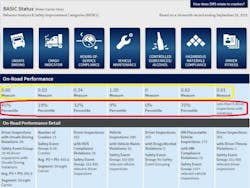The next update to the federal government’s public record of trucking company safety data will include the "absolute measures" under the BASICs—a critical metric in the recently proposed revision to the Safety Fitness Determination. But even before the scores hit the board, some in the industry argue that publishing them—indeed, their use in the SFD proposal itself—flouts the will Congress. The Federal Motor Carrier Safety Administration (FMCSA), however, insists the new numbers are fully in line with the data precautions mandated by the FAST Act.
With memos circulating among trucking groups, FMCSA spokesman Duane DeBruyne confirmed to American Trucker that the change is coming to the presentation of Safety Measurement System (SMS) data on the agency’s website, and cited the Fast Act provision that states "absolute measures shall remain available to the public"—meaning that these are, in fact, required.
Because Congress in the new highway bill required FMCSA to remove the Compliance, Safety, Accountability (CSA) carrier rankings from public view, the agency in December took down all information previously available on the website related to carrier compliance and safety performance. FMCSA ;has worked since to restore the data that is supposed to remain publicly available. The inspection and crash data came online last month, and publishing the absolute measures—or a trucking company’s score in each of the five publicly available safety categories (a calculation based on the severity weight and age of each violation under a BASIC)—is the next step in rebuilding the site's functionality.
However, the snapshot will still not include the percentile ranking derived from those carriers that have measurable (non-zero) data in the system. This is not to be confused with the blocked CSA peer-group percentiles.
Under the SFD proposal, “failure standards would be equivalent to the measures that would determine a motor carrier unfit” at the 96th percentile for the Unsafe Driving and HOS Compliance BASICs; that is, as explained in the proposed rule, “a person would know the carrier is in the worst 4 percent” of carriers with data. The SFD standards would determine that a motor carrier is unfit at the 99th percentile for the Driver Fitness, Vehicle Maintenance, and HM Compliance BASICs.
FMCSA has created an online SFD Calculator for carriers looking to see how they would be evaluated under the proposed system, as well as a user guide for the tool. The agency reports nearly 4,300 visits to the site in the last month.
The QCMobile app likewise is expected to be available again in March with the re-posting of the absolute measures.
The SMS is due to be refreshed with February’s data the week of March 7.
But the coming SMS display changes are already being criticized.
More confusion?
The Transportation Intermediaries Assn., which represents brokers and 3PLs, lobbied Congress to remove the CSA scores from public view. The group argued the carrier rankings had become confusing, de facto safety ratings that exposed brokers and shippers to liability claims.
And TIA’s position remains that the safety rating is the “sole determination of whether or not a carrier is safe to operate or not” and that all CSA data and scores should be removed from public view in their entirety, according to the Feb. 24 memo.
“These absolute performance measures will only further generate confusion in the marketplace when hiring a motor carrier and will give the trial bar another arrow in its quiver to seek judgment against a 3PL for negligent selection,” TIA says. “Although this is bad news for the 3PL industry, it is not illegal under the FAST Act signed into law in December of 2015. However, it does seem to be in firm contradiction to Congressional intent. The executive and legislative branches of the federal government were clear in their message within the FAST Act, that the CSA initiative is a flawed and failed product that needs to go back to the drawing board and be reworked comprehensively.”
Similarly, a coalition of small-business groups has pressed Congress about the use of questionable data in the new fitness rating plan. The group contends the CSA program and its reliance on roadside inspection data is unfair to small trucking companies.
Joe Rajkovacz, director of governmental affairs and communications for the Western States Trucking Assn., says the publication of the BASIC measures is another indication “the agency has decided to circumvent what Congress wanted.”
“They just redefining terms,” Rajkovacz told American Trucker.
More broadly, however, making the data public doesn’t actually mean much inside the industry, he suggests.
“Here’s the real truth: Motor carriers, brokers, shippers, insurance companies—they all still have access because Congress didn’t prohibit private parties to require that data in contracting,” Rajkovacz said. “To some degree, what Congress did in the highway bill was put lipstick on a pig. [CSA] is still a pig.”
The problem for trucking companies remains that those outside the industry do not understand the system, and the public scores are “incendiary” when the press and trial lawyers try to “smear motor carriers” for paperwork violations that have little to do with highway safety.
The SFD proposal remains open for public comment through March 21.





